Mr. Pip Essay: Character and Name Analysis in Postcolonial Literature
VerifiedAdded on 2022/11/25
|6
|1996
|75
Essay
AI Summary
This essay provides a comprehensive analysis of the novel Mr. Pip, exploring the characters and their names within the context of postcolonial literature. It delves into Homi Bhabha's concept of cultural hybridity and its relevance to the characters, particularly Matilda, and their relationship with the novel Great Expectations. The essay examines the dual nature of identity, exploring both cultural and self-identity, and how these concepts are portrayed through the characters of Matilda and Mr. Watts. It analyzes Matilda's connection to Great Expectations and her search for identity, as well as Mr. Watts' adoption of various identities. The essay also touches upon the character of Dolores, Matilda's mother, and her perspective on the 'white world' and the influence of literature. Ultimately, the essay highlights the themes of identity, cultural exchange, and the power of literature in shaping individual lives.
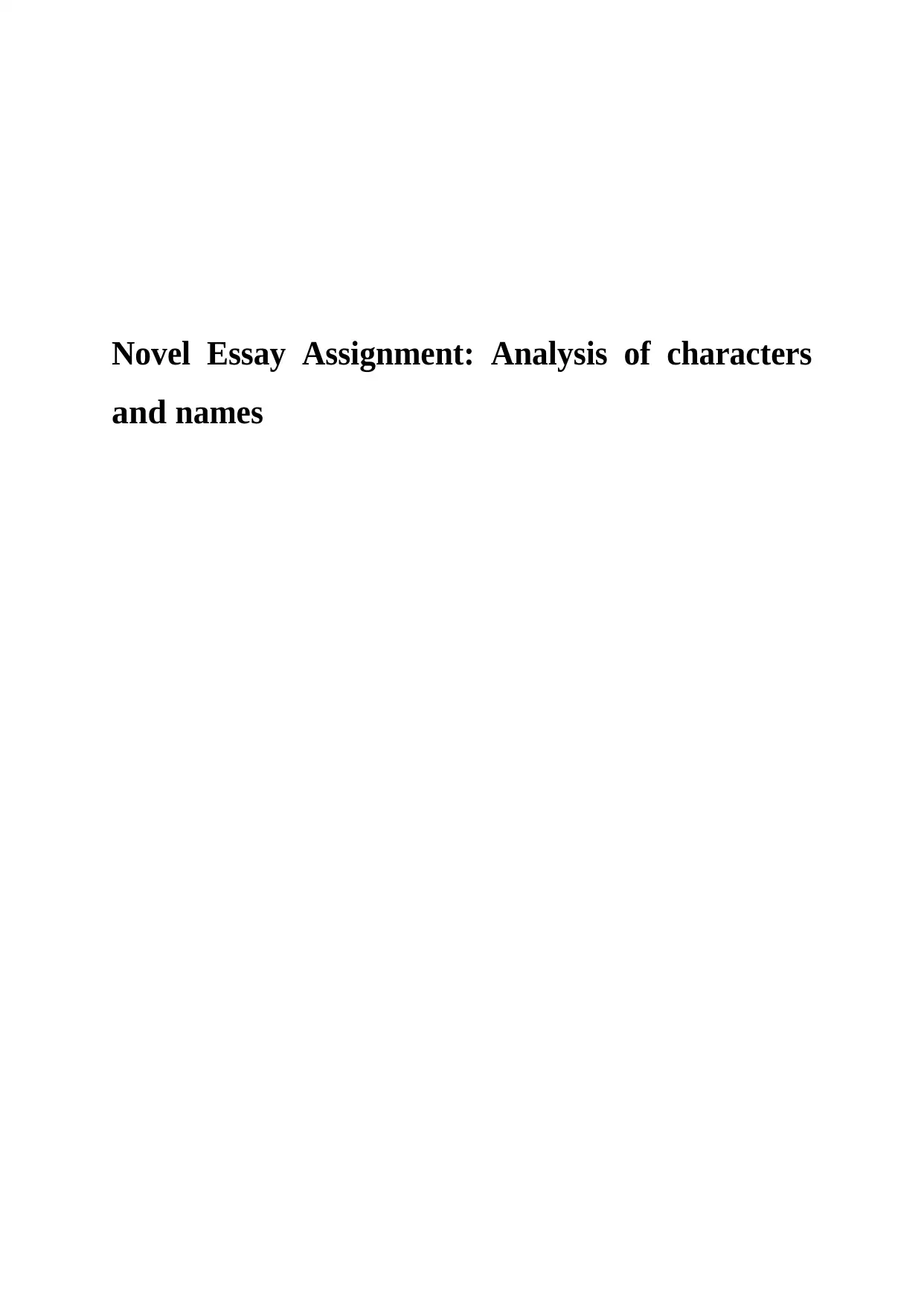
Novel Essay Assignment: Analysis of characters
and names
and names
Paraphrase This Document
Need a fresh take? Get an instant paraphrase of this document with our AI Paraphraser

Name:JongHyun Ha
Date: 2019-04-06
Date: 2019-04-06
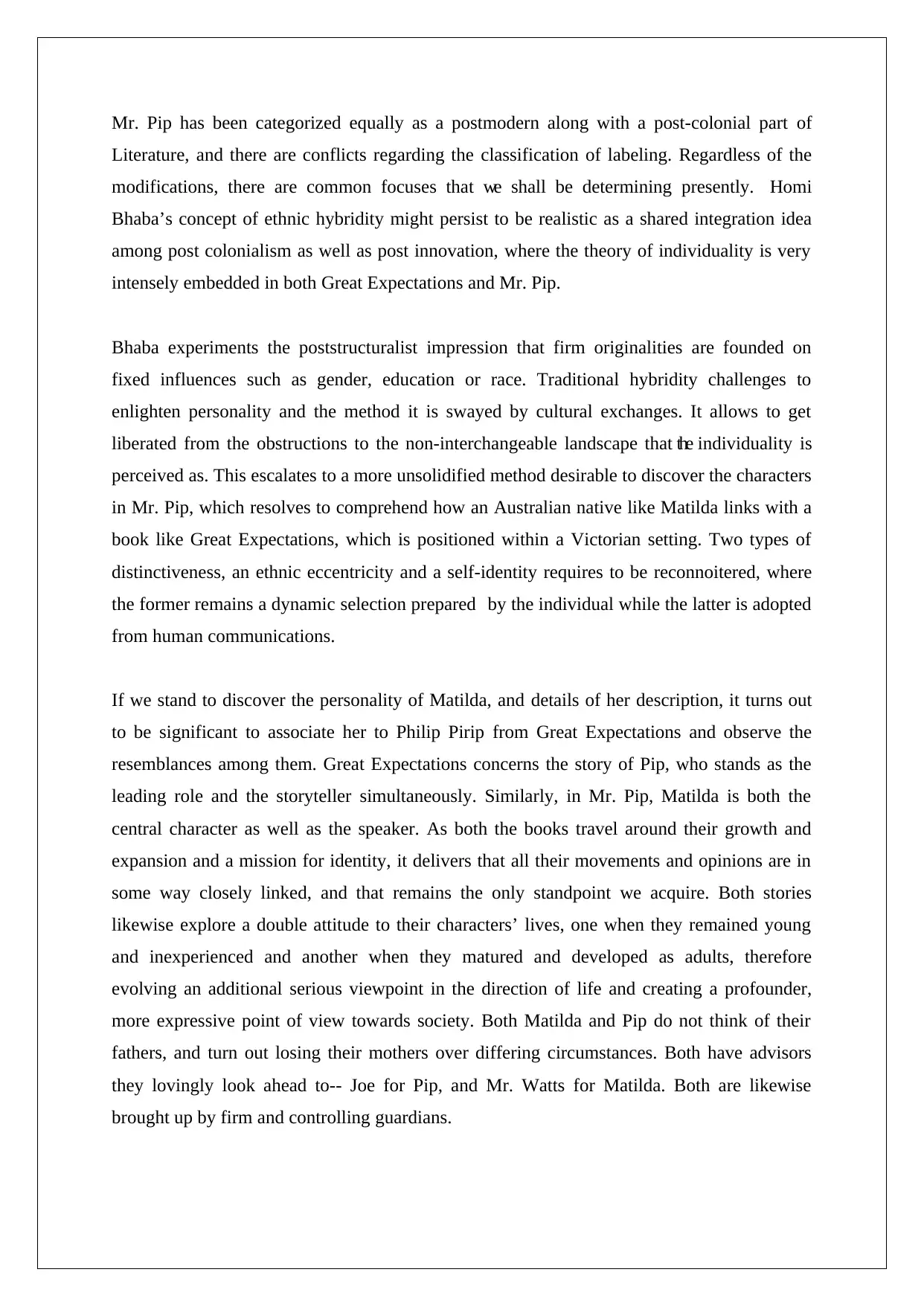
Mr. Pip has been categorized equally as a postmodern along with a post-colonial part of
Literature, and there are conflicts regarding the classification of labeling. Regardless of the
modifications, there are common focuses that we shall be determining presently. Homi
Bhaba’s concept of ethnic hybridity might persist to be realistic as a shared integration idea
among post colonialism as well as post innovation, where the theory of individuality is very
intensely embedded in both Great Expectations and Mr. Pip.
Bhaba experiments the poststructuralist impression that firm originalities are founded on
fixed influences such as gender, education or race. Traditional hybridity challenges to
enlighten personality and the method it is swayed by cultural exchanges. It allows to get
liberated from the obstructions to the non-interchangeable landscape that the individuality is
perceived as. This escalates to a more unsolidified method desirable to discover the characters
in Mr. Pip, which resolves to comprehend how an Australian native like Matilda links with a
book like Great Expectations, which is positioned within a Victorian setting. Two types of
distinctiveness, an ethnic eccentricity and a self-identity requires to be reconnoitered, where
the former remains a dynamic selection prepared by the individual while the latter is adopted
from human communications.
If we stand to discover the personality of Matilda, and details of her description, it turns out
to be significant to associate her to Philip Pirip from Great Expectations and observe the
resemblances among them. Great Expectations concerns the story of Pip, who stands as the
leading role and the storyteller simultaneously. Similarly, in Mr. Pip, Matilda is both the
central character as well as the speaker. As both the books travel around their growth and
expansion and a mission for identity, it delivers that all their movements and opinions are in
some way closely linked, and that remains the only standpoint we acquire. Both stories
likewise explore a double attitude to their characters’ lives, one when they remained young
and inexperienced and another when they matured and developed as adults, therefore
evolving an additional serious viewpoint in the direction of life and creating a profounder,
more expressive point of view towards society. Both Matilda and Pip do not think of their
fathers, and turn out losing their mothers over differing circumstances. Both have advisors
they lovingly look ahead to-- Joe for Pip, and Mr. Watts for Matilda. Both are likewise
brought up by firm and controlling guardians.
Literature, and there are conflicts regarding the classification of labeling. Regardless of the
modifications, there are common focuses that we shall be determining presently. Homi
Bhaba’s concept of ethnic hybridity might persist to be realistic as a shared integration idea
among post colonialism as well as post innovation, where the theory of individuality is very
intensely embedded in both Great Expectations and Mr. Pip.
Bhaba experiments the poststructuralist impression that firm originalities are founded on
fixed influences such as gender, education or race. Traditional hybridity challenges to
enlighten personality and the method it is swayed by cultural exchanges. It allows to get
liberated from the obstructions to the non-interchangeable landscape that the individuality is
perceived as. This escalates to a more unsolidified method desirable to discover the characters
in Mr. Pip, which resolves to comprehend how an Australian native like Matilda links with a
book like Great Expectations, which is positioned within a Victorian setting. Two types of
distinctiveness, an ethnic eccentricity and a self-identity requires to be reconnoitered, where
the former remains a dynamic selection prepared by the individual while the latter is adopted
from human communications.
If we stand to discover the personality of Matilda, and details of her description, it turns out
to be significant to associate her to Philip Pirip from Great Expectations and observe the
resemblances among them. Great Expectations concerns the story of Pip, who stands as the
leading role and the storyteller simultaneously. Similarly, in Mr. Pip, Matilda is both the
central character as well as the speaker. As both the books travel around their growth and
expansion and a mission for identity, it delivers that all their movements and opinions are in
some way closely linked, and that remains the only standpoint we acquire. Both stories
likewise explore a double attitude to their characters’ lives, one when they remained young
and inexperienced and another when they matured and developed as adults, therefore
evolving an additional serious viewpoint in the direction of life and creating a profounder,
more expressive point of view towards society. Both Matilda and Pip do not think of their
fathers, and turn out losing their mothers over differing circumstances. Both have advisors
they lovingly look ahead to-- Joe for Pip, and Mr. Watts for Matilda. Both are likewise
brought up by firm and controlling guardians.
⊘ This is a preview!⊘
Do you want full access?
Subscribe today to unlock all pages.

Trusted by 1+ million students worldwide
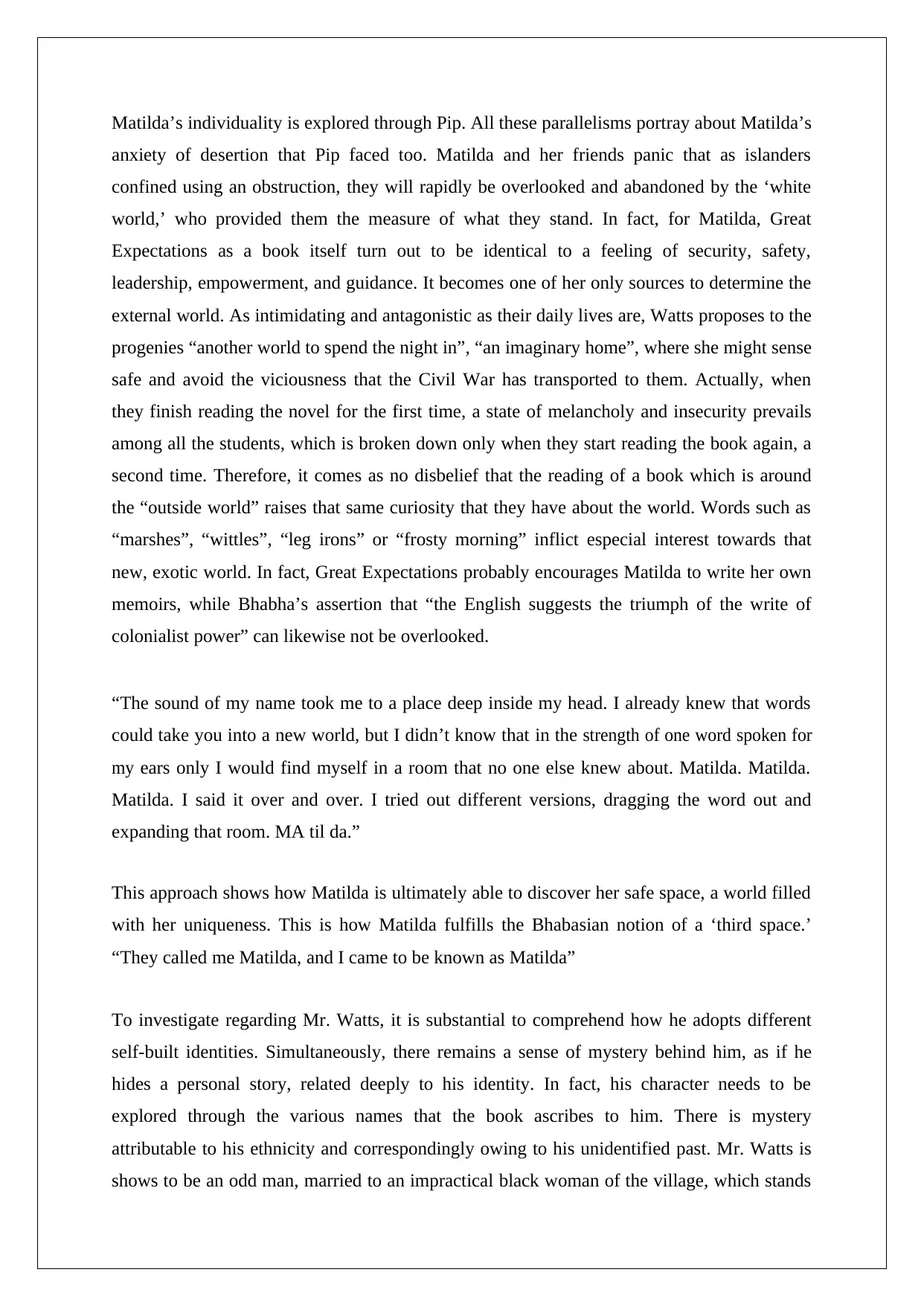
Matilda’s individuality is explored through Pip. All these parallelisms portray about Matilda’s
anxiety of desertion that Pip faced too. Matilda and her friends panic that as islanders
confined using an obstruction, they will rapidly be overlooked and abandoned by the ‘white
world,’ who provided them the measure of what they stand. In fact, for Matilda, Great
Expectations as a book itself turn out to be identical to a feeling of security, safety,
leadership, empowerment, and guidance. It becomes one of her only sources to determine the
external world. As intimidating and antagonistic as their daily lives are, Watts proposes to the
progenies “another world to spend the night in”, “an imaginary home”, where she might sense
safe and avoid the viciousness that the Civil War has transported to them. Actually, when
they finish reading the novel for the first time, a state of melancholy and insecurity prevails
among all the students, which is broken down only when they start reading the book again, a
second time. Therefore, it comes as no disbelief that the reading of a book which is around
the “outside world” raises that same curiosity that they have about the world. Words such as
“marshes”, “wittles”, “leg irons” or “frosty morning” inflict especial interest towards that
new, exotic world. In fact, Great Expectations probably encourages Matilda to write her own
memoirs, while Bhabha’s assertion that “the English suggests the triumph of the write of
colonialist power” can likewise not be overlooked.
“The sound of my name took me to a place deep inside my head. I already knew that words
could take you into a new world, but I didn’t know that in the strength of one word spoken for
my ears only I would find myself in a room that no one else knew about. Matilda. Matilda.
Matilda. I said it over and over. I tried out different versions, dragging the word out and
expanding that room. MA til da.”
This approach shows how Matilda is ultimately able to discover her safe space, a world filled
with her uniqueness. This is how Matilda fulfills the Bhabasian notion of a ‘third space.’
“They called me Matilda, and I came to be known as Matilda”
To investigate regarding Mr. Watts, it is substantial to comprehend how he adopts different
self-built identities. Simultaneously, there remains a sense of mystery behind him, as if he
hides a personal story, related deeply to his identity. In fact, his character needs to be
explored through the various names that the book ascribes to him. There is mystery
attributable to his ethnicity and correspondingly owing to his unidentified past. Mr. Watts is
shows to be an odd man, married to an impractical black woman of the village, which stands
anxiety of desertion that Pip faced too. Matilda and her friends panic that as islanders
confined using an obstruction, they will rapidly be overlooked and abandoned by the ‘white
world,’ who provided them the measure of what they stand. In fact, for Matilda, Great
Expectations as a book itself turn out to be identical to a feeling of security, safety,
leadership, empowerment, and guidance. It becomes one of her only sources to determine the
external world. As intimidating and antagonistic as their daily lives are, Watts proposes to the
progenies “another world to spend the night in”, “an imaginary home”, where she might sense
safe and avoid the viciousness that the Civil War has transported to them. Actually, when
they finish reading the novel for the first time, a state of melancholy and insecurity prevails
among all the students, which is broken down only when they start reading the book again, a
second time. Therefore, it comes as no disbelief that the reading of a book which is around
the “outside world” raises that same curiosity that they have about the world. Words such as
“marshes”, “wittles”, “leg irons” or “frosty morning” inflict especial interest towards that
new, exotic world. In fact, Great Expectations probably encourages Matilda to write her own
memoirs, while Bhabha’s assertion that “the English suggests the triumph of the write of
colonialist power” can likewise not be overlooked.
“The sound of my name took me to a place deep inside my head. I already knew that words
could take you into a new world, but I didn’t know that in the strength of one word spoken for
my ears only I would find myself in a room that no one else knew about. Matilda. Matilda.
Matilda. I said it over and over. I tried out different versions, dragging the word out and
expanding that room. MA til da.”
This approach shows how Matilda is ultimately able to discover her safe space, a world filled
with her uniqueness. This is how Matilda fulfills the Bhabasian notion of a ‘third space.’
“They called me Matilda, and I came to be known as Matilda”
To investigate regarding Mr. Watts, it is substantial to comprehend how he adopts different
self-built identities. Simultaneously, there remains a sense of mystery behind him, as if he
hides a personal story, related deeply to his identity. In fact, his character needs to be
explored through the various names that the book ascribes to him. There is mystery
attributable to his ethnicity and correspondingly owing to his unidentified past. Mr. Watts is
shows to be an odd man, married to an impractical black woman of the village, which stands
Paraphrase This Document
Need a fresh take? Get an instant paraphrase of this document with our AI Paraphraser
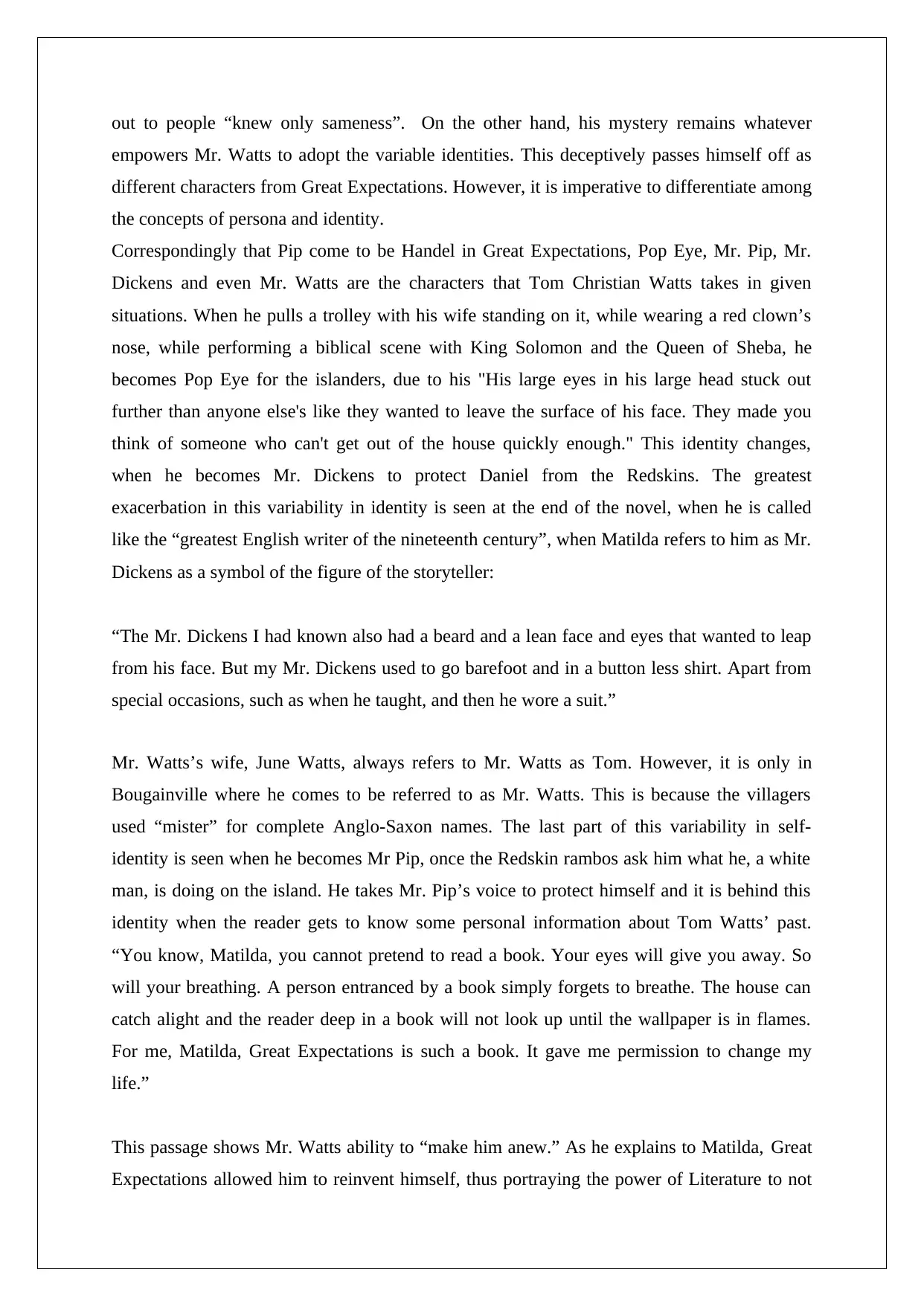
out to people “knew only sameness”. On the other hand, his mystery remains whatever
empowers Mr. Watts to adopt the variable identities. This deceptively passes himself off as
different characters from Great Expectations. However, it is imperative to differentiate among
the concepts of persona and identity.
Correspondingly that Pip come to be Handel in Great Expectations, Pop Eye, Mr. Pip, Mr.
Dickens and even Mr. Watts are the characters that Tom Christian Watts takes in given
situations. When he pulls a trolley with his wife standing on it, while wearing a red clown’s
nose, while performing a biblical scene with King Solomon and the Queen of Sheba, he
becomes Pop Eye for the islanders, due to his "His large eyes in his large head stuck out
further than anyone else's like they wanted to leave the surface of his face. They made you
think of someone who can't get out of the house quickly enough." This identity changes,
when he becomes Mr. Dickens to protect Daniel from the Redskins. The greatest
exacerbation in this variability in identity is seen at the end of the novel, when he is called
like the “greatest English writer of the nineteenth century”, when Matilda refers to him as Mr.
Dickens as a symbol of the figure of the storyteller:
“The Mr. Dickens I had known also had a beard and a lean face and eyes that wanted to leap
from his face. But my Mr. Dickens used to go barefoot and in a button less shirt. Apart from
special occasions, such as when he taught, and then he wore a suit.”
Mr. Watts’s wife, June Watts, always refers to Mr. Watts as Tom. However, it is only in
Bougainville where he comes to be referred to as Mr. Watts. This is because the villagers
used “mister” for complete Anglo-Saxon names. The last part of this variability in self-
identity is seen when he becomes Mr Pip, once the Redskin rambos ask him what he, a white
man, is doing on the island. He takes Mr. Pip’s voice to protect himself and it is behind this
identity when the reader gets to know some personal information about Tom Watts’ past.
“You know, Matilda, you cannot pretend to read a book. Your eyes will give you away. So
will your breathing. A person entranced by a book simply forgets to breathe. The house can
catch alight and the reader deep in a book will not look up until the wallpaper is in flames.
For me, Matilda, Great Expectations is such a book. It gave me permission to change my
life.”
This passage shows Mr. Watts ability to “make him anew.” As he explains to Matilda, Great
Expectations allowed him to reinvent himself, thus portraying the power of Literature to not
empowers Mr. Watts to adopt the variable identities. This deceptively passes himself off as
different characters from Great Expectations. However, it is imperative to differentiate among
the concepts of persona and identity.
Correspondingly that Pip come to be Handel in Great Expectations, Pop Eye, Mr. Pip, Mr.
Dickens and even Mr. Watts are the characters that Tom Christian Watts takes in given
situations. When he pulls a trolley with his wife standing on it, while wearing a red clown’s
nose, while performing a biblical scene with King Solomon and the Queen of Sheba, he
becomes Pop Eye for the islanders, due to his "His large eyes in his large head stuck out
further than anyone else's like they wanted to leave the surface of his face. They made you
think of someone who can't get out of the house quickly enough." This identity changes,
when he becomes Mr. Dickens to protect Daniel from the Redskins. The greatest
exacerbation in this variability in identity is seen at the end of the novel, when he is called
like the “greatest English writer of the nineteenth century”, when Matilda refers to him as Mr.
Dickens as a symbol of the figure of the storyteller:
“The Mr. Dickens I had known also had a beard and a lean face and eyes that wanted to leap
from his face. But my Mr. Dickens used to go barefoot and in a button less shirt. Apart from
special occasions, such as when he taught, and then he wore a suit.”
Mr. Watts’s wife, June Watts, always refers to Mr. Watts as Tom. However, it is only in
Bougainville where he comes to be referred to as Mr. Watts. This is because the villagers
used “mister” for complete Anglo-Saxon names. The last part of this variability in self-
identity is seen when he becomes Mr Pip, once the Redskin rambos ask him what he, a white
man, is doing on the island. He takes Mr. Pip’s voice to protect himself and it is behind this
identity when the reader gets to know some personal information about Tom Watts’ past.
“You know, Matilda, you cannot pretend to read a book. Your eyes will give you away. So
will your breathing. A person entranced by a book simply forgets to breathe. The house can
catch alight and the reader deep in a book will not look up until the wallpaper is in flames.
For me, Matilda, Great Expectations is such a book. It gave me permission to change my
life.”
This passage shows Mr. Watts ability to “make him anew.” As he explains to Matilda, Great
Expectations allowed him to reinvent himself, thus portraying the power of Literature to not
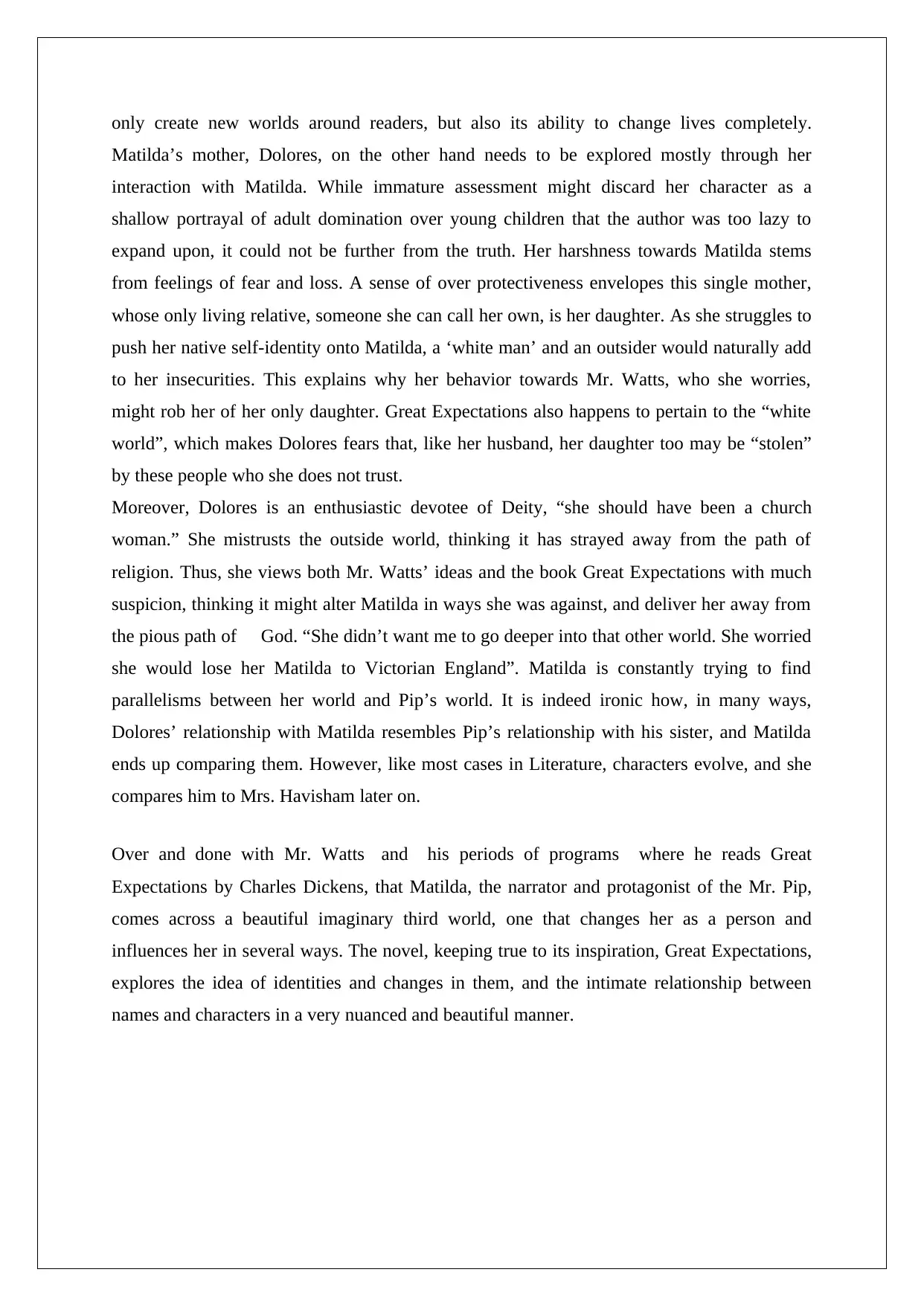
only create new worlds around readers, but also its ability to change lives completely.
Matilda’s mother, Dolores, on the other hand needs to be explored mostly through her
interaction with Matilda. While immature assessment might discard her character as a
shallow portrayal of adult domination over young children that the author was too lazy to
expand upon, it could not be further from the truth. Her harshness towards Matilda stems
from feelings of fear and loss. A sense of over protectiveness envelopes this single mother,
whose only living relative, someone she can call her own, is her daughter. As she struggles to
push her native self-identity onto Matilda, a ‘white man’ and an outsider would naturally add
to her insecurities. This explains why her behavior towards Mr. Watts, who she worries,
might rob her of her only daughter. Great Expectations also happens to pertain to the “white
world”, which makes Dolores fears that, like her husband, her daughter too may be “stolen”
by these people who she does not trust.
Moreover, Dolores is an enthusiastic devotee of Deity, “she should have been a church
woman.” She mistrusts the outside world, thinking it has strayed away from the path of
religion. Thus, she views both Mr. Watts’ ideas and the book Great Expectations with much
suspicion, thinking it might alter Matilda in ways she was against, and deliver her away from
the pious path of God. “She didn’t want me to go deeper into that other world. She worried
she would lose her Matilda to Victorian England”. Matilda is constantly trying to find
parallelisms between her world and Pip’s world. It is indeed ironic how, in many ways,
Dolores’ relationship with Matilda resembles Pip’s relationship with his sister, and Matilda
ends up comparing them. However, like most cases in Literature, characters evolve, and she
compares him to Mrs. Havisham later on.
Over and done with Mr. Watts and his periods of programs where he reads Great
Expectations by Charles Dickens, that Matilda, the narrator and protagonist of the Mr. Pip,
comes across a beautiful imaginary third world, one that changes her as a person and
influences her in several ways. The novel, keeping true to its inspiration, Great Expectations,
explores the idea of identities and changes in them, and the intimate relationship between
names and characters in a very nuanced and beautiful manner.
Matilda’s mother, Dolores, on the other hand needs to be explored mostly through her
interaction with Matilda. While immature assessment might discard her character as a
shallow portrayal of adult domination over young children that the author was too lazy to
expand upon, it could not be further from the truth. Her harshness towards Matilda stems
from feelings of fear and loss. A sense of over protectiveness envelopes this single mother,
whose only living relative, someone she can call her own, is her daughter. As she struggles to
push her native self-identity onto Matilda, a ‘white man’ and an outsider would naturally add
to her insecurities. This explains why her behavior towards Mr. Watts, who she worries,
might rob her of her only daughter. Great Expectations also happens to pertain to the “white
world”, which makes Dolores fears that, like her husband, her daughter too may be “stolen”
by these people who she does not trust.
Moreover, Dolores is an enthusiastic devotee of Deity, “she should have been a church
woman.” She mistrusts the outside world, thinking it has strayed away from the path of
religion. Thus, she views both Mr. Watts’ ideas and the book Great Expectations with much
suspicion, thinking it might alter Matilda in ways she was against, and deliver her away from
the pious path of God. “She didn’t want me to go deeper into that other world. She worried
she would lose her Matilda to Victorian England”. Matilda is constantly trying to find
parallelisms between her world and Pip’s world. It is indeed ironic how, in many ways,
Dolores’ relationship with Matilda resembles Pip’s relationship with his sister, and Matilda
ends up comparing them. However, like most cases in Literature, characters evolve, and she
compares him to Mrs. Havisham later on.
Over and done with Mr. Watts and his periods of programs where he reads Great
Expectations by Charles Dickens, that Matilda, the narrator and protagonist of the Mr. Pip,
comes across a beautiful imaginary third world, one that changes her as a person and
influences her in several ways. The novel, keeping true to its inspiration, Great Expectations,
explores the idea of identities and changes in them, and the intimate relationship between
names and characters in a very nuanced and beautiful manner.
⊘ This is a preview!⊘
Do you want full access?
Subscribe today to unlock all pages.

Trusted by 1+ million students worldwide
1 out of 6
Your All-in-One AI-Powered Toolkit for Academic Success.
+13062052269
info@desklib.com
Available 24*7 on WhatsApp / Email
![[object Object]](/_next/static/media/star-bottom.7253800d.svg)
Unlock your academic potential
Copyright © 2020–2026 A2Z Services. All Rights Reserved. Developed and managed by ZUCOL.